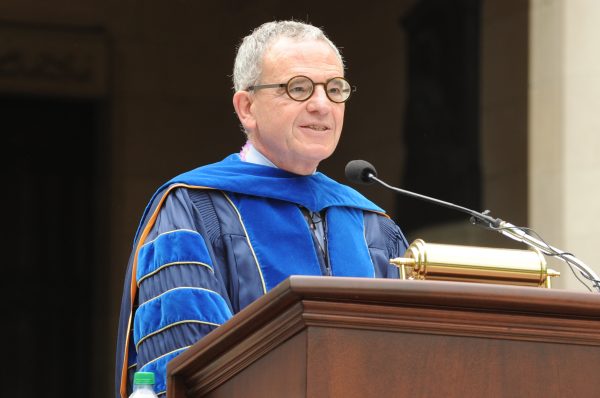Provost Search Picks Up Momentum, Seeks Community Support
CHRIS TAGGART 2012
Freedman was appointed as provost, a newly-created position, in 2010. (COURTESY OF FORDHAM NEWS AND MEDIA RELATIONS)
September 26, 2018
In early September, Fordham University embarked on one of its most pressing tasks for the upcoming year: the search for a permanent provost. In order to find the right fit for Fordham, the university has enlisted the help of outside recruitment agencies, faculty representatives, and students.
In early July, the passing of university provost Stephen Freedman, Ph.D., shocked the Fordham community. Freedman had held the position since 2010 and oversaw the university’s academics, institutional research, fellowships and international education.
The provost search committee is made up of two components: a faculty team, chaired by Dean of the Graduate School of Education Virginia Roach, Ed.D., working in conjunction with a four-person team from executive search firm Witt-Kieffer, which has already conducted previous hiring searches for the university.
“It’s quite large,” Witt-Kieffer representative Sheila Murphy said of the firm’s team. The group will aid the university’s committee by providing “extensive recruitment and outreach” in the world of higher education while gathering candidates for the position. Fordham’s committee, on the other hand, is responsible for ensuring the university community’s voice is heeded throughout the process. Together, the team aims to have a permanent provost in office by the end of December.
The four-month selection process began in early September as Witt-Kieffer and Fordham held open forums with faculty members, administrators and students on both the Lincoln Center and Rose Hill campuses. In these discussions, the search committee sought to understand what the university community expected in a provost. Before embarking on recruitment, Roach said, the committee wanted the forums to “inform the way we talk about the position.”
Fordham students were invited to participate in the provost search via a Sept. 6 email invitation to two student forums, one on Wednesday, Sept. 12 at Lincoln Center, and another on Monday, Sept. 17 at Rose Hill. The entirety of Fordham’s search committee, as well as Murphy and Jean Dowdall, another Witt-Kieffer representative, directed each meeting.
While Roach reported encouraging turnout for faculty forums, only four students attended the Rose Hill student forum – and just two attended the the Lincoln Center discussion. Nevertheless, Roach and Murphy both sat down with the attendees and asked their opinion on the new provost: what their role should be, what they should focus on and what qualities they should possess.
Emma Quinn, Fordham College Lincoln Center (FCLC) ’20, did not attend the forum, like many other students. “Fordham isn’t clear about what a Provost does,” she explained, “and so I wasn’t sure why the meeting was relevant to me as a student.”
After collecting community input, Witt-Kieffer representatives will begin to recruit potential candidates via advertisements, emails and telephone calls. Murphy said the team will make an “institutional statement” by placing an advertisement in the Chronicle of Higher Education, a highly-regarded newspaper for university coverage.
Members of a search committee appointed by the president will review all applications before deciding on a group of eight to twelve candidates. This preliminary group will then undergo an interview stage, after which a final pool of three to five members remain. The university president, Rev. Joseph M. McShane, S.J., will then review the final three candidates and make the ultimate decision himself.
Roach and Murphy have told The Observer that the inner workings of the provost search committee, including potential candidates and specific criteria, are strictly confidential.
Following Freedman’s death, McShane appointed Associate Professor of Political Science Jonathan Crystal, Ph. D., to the role of interim provost under the titles of interim vice president and chief academic officer.
During his time in office, Crystal aims to further many of the goals of former Provost Freedman, including supporting research that preserves Fordham’s commitment to Cura Personalis and “furthering the globalization of the University.” Crystal specifically mentioned his plans to support faculty research, integrating technology into the classroom and interdisciplinary programs between Fordham’s graduate schools.
“I don’t think any Provost can accomplish much alone,” Crystal said. “He or she must work collaboratively with the deans, the faculty and other administrators in order to make Fordham a stronger academic institution.”
Witt-Kieffer and the faculty committee continue to encourage students, faculty and staff alike to make their voice heard in the search for the provost. Inquiries and comments can still be forwarded to [email protected].












